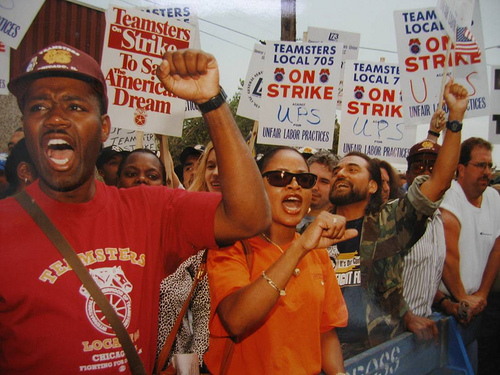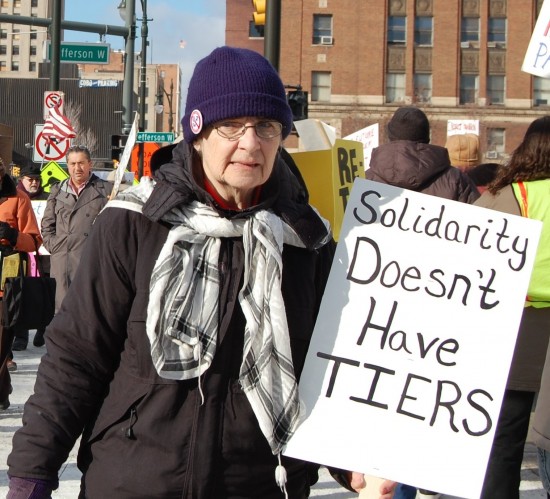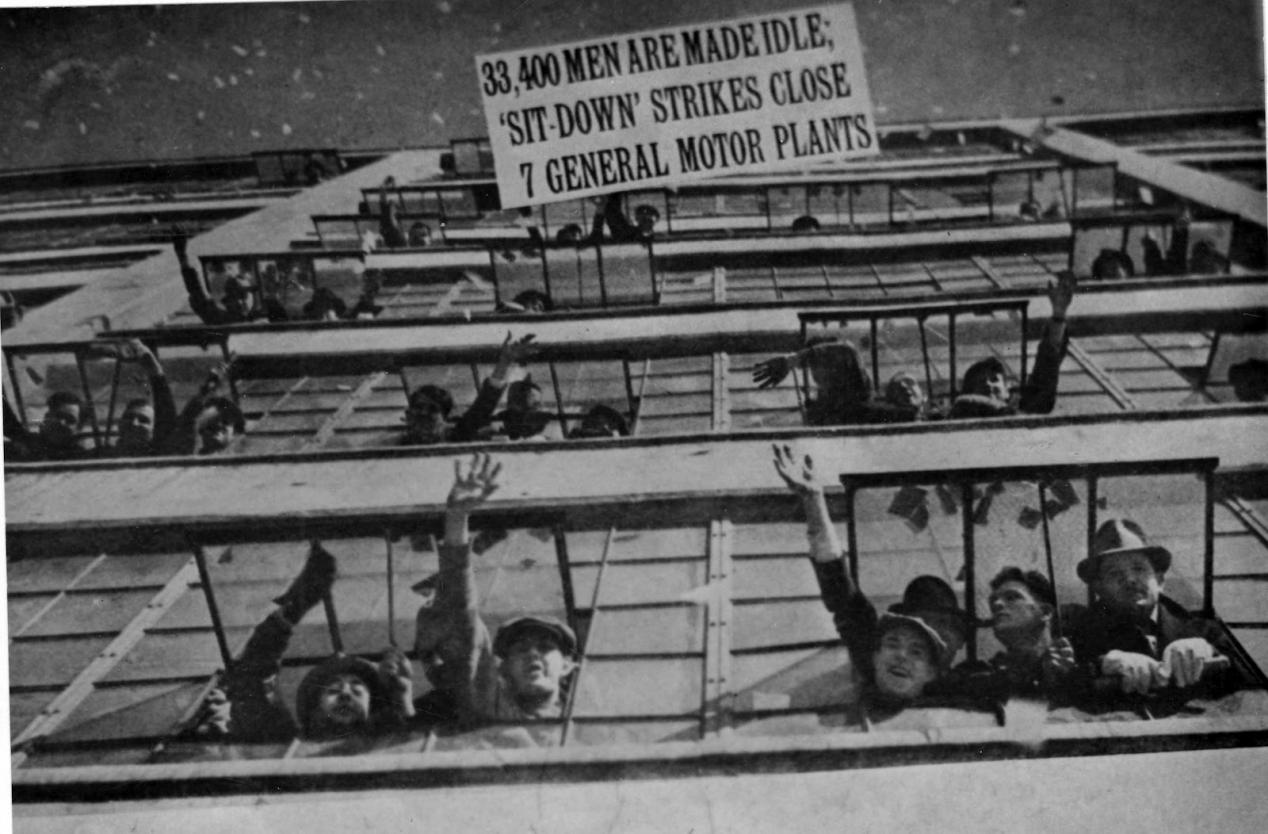by Ron Lare
December 14, 2012
To the extent that “Michigan is a union state,” or even “the union state,” the strengths and weaknesses of the current union movement have a special weight here. For the moment, the weaknesses have overwhelmed the strengths.

Michigan Governor Rick Snyder certainly “reinvented” Michigan–but how?
The shortest way to say why “right to work” was possible in Michigan is this: “Unions lost community support.” Why did unions lose community support?
These are two related but distinct statements:
- Unions gained influence when they were fighting for all workers.
- Unions gained influence when they were fighting for all workers.
The UAW leadership understands the first statement better than the second–at least, they repeat the first in words. But when they say “fight” today, they mean what the leadership does sitting at a table arguing with management, not what workers do on a picket line. I started work at Ford in 1978. There has not been a national Ford strike since 1976.
If workers, union and non-union, see a union fighting, they will often forgive losing. If they see a union not fighting and see it losing what they had, right-wing politicians can take advantage of lost working class support to deal unions grave or mortal blows such as “right to work” laws.
The broad public support for the 1997 UPS strike came partly because a union was fighting for a demand that would help the broader community: more jobs. It also came because someone, somewhere, was fighting the power–win or lose.

However, unions have been surrendering the future of the whole working class by making concessions, especially for new and young workers. Did we think their families didn’t notice?
There are Ford jobs that used to be paid the equivalent of $28 an hour that are now paid half or less than half of that. Ford and the UAW would likely reply, “When concessions were made or plants were sold, we negotiated protections for workers already hired, offered them buyouts, provided seniority-based transfers to other Ford plants, etc.”
There is a lot to criticize in that claim even with regard to seniority Ford workers, but the most important problem with it is this: If one follows the jobs, rather than just the seniority workers, one finds that jobs in some plants that were once Ford plants are now taking new hires at $11 an hour. They aren’t Ford jobs any longer, but a job at less pay is a job at less pay.
Thus unions claim to have protected “our members,” but the working class as a whole sees collaboration in catastrophic give-backs because now the same jobs–whoever owns the plant or the operation–pay much less. How will young, new workers start families or buy houses and cars on $11?

The leadership’s instincts developed for decades in the process of making concessions and accepting Big Three operation spin-offs and outsourcing. These instincts kicked in again when unions confronted the “right to work” endgame in Michigan.
According to the New York Times, “Not long after Thanksgiving, as word spread of an effort to ban mandatory union contributions, labor leaders began holding meetings with [Michigan Governor] Snyder, his aides and lawmakers. The labor leaders said they believed the talks had been going along productively until last week” (December 10, 2012).
This seemed to the leaders the natural thing to do: Talk to the boss.
That is to say that in a crisis, the leaders showed their orientation to the capitalists rather than to their rank and file. The Chicago Teachers Union’s orientation is to talk first to the rank and file, but that’s rare in today’s union movement. What if labor leaders in Michigan had looked first to the rank and file instead of Boss Snyder, and what if they had led workers rather than begged politicians?
Even Jesse Jackson, no enemy of the capitalists, called for a major strike to oppose the Michigan “right to work” law. What might the union leaderships have done instead of asking Snyder to be on their side?
The union leadership could have asked all union members to skip work and come to Lansing yesterday and told them they’d be paid out of the UAW’s $600-700 million dollar strike fund. In saying this, they could have made clear to the members that they’d be taking a risk, but promised to defend them with further strike action. They could have explained to the public that the unions intend to organize job actions in support of the Employee Free Choice Act (EFCA) to help all workers organize unions, regardless of what the Democratic Party says.
Calling for members to skip work on Tuesday would have been called a violation of contract “no strike” clauses. This would be risky–so was the Flint sit-down. The union leaderships have forgotten that taking some risks and breaking some rules were an essential part of building unions in the first place. And when Obama did not fight for the Employee Free Choice Act, they forgot about that too. But fighting for all workers is necessary to rebuild the union movement.
To survive and build toward such action and re-gain broad working class support, unions need to take a page from the book of the non-majority unions, which function as a union without first winning an election among all the workers at a job. Black Workers for Justice has done related work. These brave efforts have proved that a union can have an effect even without formal representation rights, let alone dues check-off.

What will it take to see actions as bold as the Flint strike of 1936-1937?
To borrow an idea from a conference I attended in Canada, what if a union in some major city said, “We will represent all the fast food workers in this city,” and proceeded to build a campaign to that end with advice on organizing a union and legal representation attempting to make all grievances into civil rights cases? What if that union maintained that support whether or not workers joined? Such a campaign would be costly. This project might take risks with secondary boycotts. But it would show a union fighting for all workers, especially young workers still living at home. (An issue for another article is how “right to work” laws affect Black and Latino/a communities and women and other oppressed groups for whom union rights are especially closely linked to civil rights.)
Various aspects of what is needed are being tried. Minority unions, the Walmart workers’ action, the Chicago Teachers Union, the United Electrical Workers, workers’ centers, port shutdowns, and strikes by immigrant workers–even those without unions–have illustrated important aspects of the way forward.
To take this further we need new union leaderships building toward a new CIO. When current union structures have not met the needs of the workers movement, workers have created new ones, such as when the Congress of Industrial Organizations grew up alongside the old American Federation of Labor. Such a change can come only out of a mass movement for change. It cannot be “declared” by a few activists. But the labor movement is at a breaking point that needs to become a turning point. This time, I suspect, it will have to develop together with political action independent of both the Democrats and Republicans if it is to be successful.
Ron Lare is a retired member of UAW Local 600, which represents the Ford Rouge Plant and other locations.

Comments
3 responses to “Workers Respect Fighters: A Retired Autoworker Reacts to “Right to Work” in Michigan”
Fred:
Thanks very much for the very relevant history and comments. Can I get your email address? Mine is ronlare@sbcglobal.net Judy Wraight and I can put you on our UAW-Ford 600Alert email list.
Lansing and Bogotá
The new “right to work” (for less) laws in Michigan show why workers here should care about what is happening to General Motors-Colombia workers. This is not only for progressive political and moral reasons, but out of our own self-interest as well.
At the candlelight vigil at GM Executive Cathy Clegg’s house, participants noted that that very morning the protesters at the latest rally against the “right to work” legislation were gassed by police in Lansing.
Five days later, a larger rally was held in Lansing on the day that the final versions of the anti-union, anti-worker were adopted by the Michigan legislature and signed by Governor Snyder.
At that rally in Lansing, Jorge Parra, President of the injured and fired Colombian GM workers’ union, ASOTRECOL, was present. This was despite his being on his 22nd of hunger strike–as were his fellow GM hunger strikers still in Colombia.
Meanwhile, Melvin Thompson, a former UAW-Chrysler local president, went on hunger strike at the same time as Brother Parra. One could not ask for a more graphic symbol of international solidarity and courage.
Without more determined and larger union action, Michigan workers will continue to sink toward the conditions imposed by auto companies in nations such as Colombia. Workers there are fired for being injured. Indeed, something approaching this situation is already the case for Long-Term Supplemental (temporary) workers in the US at Ford and other auto companies. GM-Colombia conditions are already foreshadowed even for temporary workers in some US union shops , much more so in non-union shops, and now in Michigan law.
Seen even from the most self-interested or practical point of view, if conditions in Colombia and other nations do not rise toward the best of US union conditions via international solidarity, US pay and conditions will continue to sink toward those in Colombia and other oppressed nations.
It is no longer the case that a return to the best days of internal US union democracy and militant struggle can by itself save US unions and workers. Today, international solidarity is as important as any other key to victory.
To know this is to be proactive enough to participate in the fight to support the GM-Colombia hunger strikers for their just demands on GM. As hunger strikers, their time is short. As US workers forced with them into the international “race to the bottom”, our time is short as well. Our time is short to say “No” to that race and turn united international labor solidarity action against GM’s abuses.
Again: time is short for us all.
Ron Lare
Hello Ron,
I agree that when the union movement started they were fighting for workers rights meaning ALL WORKING PEOPLE everywhere. At least in the eyes of the general public. When the Unions won at say, Ford the Ford workers benefited from the outcome and continued to do so from then on until today. It seemed to some as though there was a fence around the few. In 1962 I couldn’t get a job as a painter without being in the union. I couldn’t get in the union without having a job. It was a catch 22 situation. I painted for my Step-Father as a boy in a family business. I never did get a job as a painter. I am now retired from Ford’s where I started as a Assembly worker in “63”. The point is it seemed like the unions had things sewed-up if you were on in outside looking in. I think your article is saying that we need a new approach recapturing the public opinion that unions are fighting for ALL WORKING PEOPLE and thereby gaining the support of every person who considers his/herself a worker.Good article thank for the writing on our behalf– Fred Conn
P/S I have walked in picket lines and feared losing my home etc.